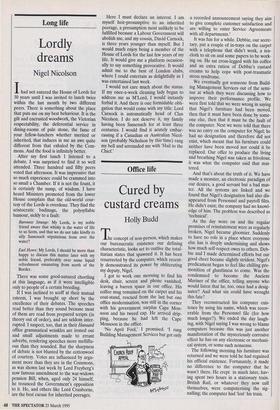Office life
Cured by custard creams
Holly Budd
he concept of non-person, which makes our bureaucratic existence our defining characteristic, looks set to outlive the total- itarian states that spawned it. It has been resurrected by the computer, which recent- ly demonstrated its power by obliterating my deputy, Nigel. I got to work one morning to find his desk, chair, screen and phone vanished, leaving a barren space in our office. His coffee mug remained on the carpet and his coat-stand, rescued from the last but one office modernisation, was still in the corner with his government surplus Cape Mon- soon and his tweed cap. He arrived drip- ping, because he had left the Cape Monsoon in the office.
`No April Fool,' I promised. 'I rang Building Management Services but got only a recorded announcement saying they aim to give complete customer satisfaction and are willing to enter Service Agreements with all departments.'
It was fun for a while. Debbie, our secre- tary, put a couple of in-trays on the carpet with a telephone that didn't work, a tea- cloth to sit on and some papers to be work- ing on. He sat cross-legged with his coffee and an extra ration of Debbie's custard creams to help cope with post-traumatic stress syndrome.
We eventually got someone from Build- ing Management Services out of the semi- nar at which they were discussing how to improve their performance profile. We were first told that we were wrong in saying that Nigel's furniture had been moved, then that it must have been done by some- one else, then that it must be the fault of the computer. Next we were told that there was no entry on the computer for Nigel; he had no designation and therefore did not exist, which meant that his furniture could neither have been moved nor could it be replaced. Our offer to produce the living and breathing Nigel was taken as frivolous; it was what the computer said that mat- tered.
And that's about the truth of it. We have made a monster, an electronic paradigm of our desires, a good servant but a bad mas- ter. All the systems are linked and we found that Nigel's designation had also dis- appeared from Personnel and payroll files. He didn't exist; the company had no knowl- edge of him. The problem was described as `technical'.
As the day wore on and the regular promises of reinstatement were as regularly broken, Nigel became gloomier. Suddenly to have no role in a place where everyone else has is deeply undermining and shows how much self-respect owes to others. Deb- bie and I made determined efforts but our good cheer became slightly strident. Nigel's predicament began to feel like chilling pre- monition of ghastliness to come. Was the condemned to become the Ancient Mariner of the office, telling anyone who would listen that he, too, once had a desig- nator? And what sin could have wrought this fate?
They reconstructed his computer exis- tence by using his name, which was recov- erable from the Personnel file (for how much longer?). We ended the day laugh- ing, with Nigel saying I was wrong to blame computers because this was just another manifestation of the mysteriously corrosive effect he has on any electronic or mechani- cal system, or some such nonsense.
The following morning his furniture was returned and we were told he had regained his official existence. Fortunately, it made no difference to the computer that he wasn't there. He crept in much later, hav- ing spent two hours in a stationary train. British Rail, or whatever they now call themselves, were computerising the sig- nalling; the computer had 'lost' his train.


























































 Previous page
Previous page